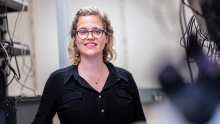UBC Science researchers have received $10.5 million in funding from Genome Canada and international partners to create the first reference genome of the sunflower family – work that will pinpoint agriculturally important genes and could result in a hybrid sunflower that provides both biofuel and food products.
The sunflower family includes 24,000 species–making it the largest plant family in the world. It is one of only a handful of economically important plant families where a reference genome is not available.
A UBC team led by Canada Research Chair Loren Rieseberg will use new and conventional technologies to sequence, assemble and annotate the genome of the cultivated sunflower.
This new information will drive advances in crop improvement, weed control and the development of woody sunflower species as a new biofuel.
One of the potential applications of this research includes the creation of a hybrid variety of sunflower, grown as a dual-use crop. The wild Silverleaf species of sunflower, known for its tall, woody stalks that grow three to 4.5 metres tall and up to 10 centimetres in diameter, could be crossbred with a commercially valuable sunflower plant that produces high-quality seeds, capitalizing on the desirable traits of both species.
"The intent is to have the basis for a breeding program within four years," says Rieseberg, a professor in the Department of Botany. "The seeds would be harvested for food and oil, while the stalks would be utilized for wood or converted to ethanol. As a dual-use crop it wouldn’t be in competition with food crops for land."
In addition, this fast-growing annual crop would be highly drought-resistant, thanks to desirable traits from the Silverleaf variety, and would therefore be suitable for use in subsistence agriculture in places like Sub-Saharan Africa, as well as in much of North America.
Nolan Kane, a post-doctoral fellow with the UBC Department of Botany, is one of the co-investigators on the project and together with colleagues at the National Institute for Agricultural Research (INRA) in France, is doing much of the bioinformatics for the genome project. Steve Knapp from the University of Georgia is another co-investigator on the project.
"The sunflower genome is 3.5 billion letters long–slightly larger than the human genome," says Kane. "The sunflower family is the largest plant family on earth – encompassing several important crops and weeds. Mapping its genome will create a very useful reference template for the entire plant family, which will enable us to work on closely related species."
The work is also being funded by the US departments of Energy and Agriculture, and by INRA.
"This significant investment from Genome Canada--and the support it has helped to leverage from partner organizations--will produce new, basic knowledge that could ultimately have a major impact on our daily lives," says John Hepburn, UBC Vice President Research and International.
"The results of this competition highlight the benefits of collaborative research funding models, while supporting the innovative and important basic research being conducted at UBC."
"Genome BC is very pleased to support this innovative project, which will capitalize on Canada's strong genomics infrastructure and leadership in sunflower genomics, in collaboration with other experts worldwide," says Dr. Alan Winter, President and CEO of Genome BC. "The potential applications of this research are extremely important, both globally and locally."
Musqueam First Nation land acknowledegement
We honour xwməθkwəy̓ əm (Musqueam) on whose ancestral, unceded territory UBC Vancouver is situated. UBC Science is committed to building meaningful relationships with Indigenous peoples so we can advance Reconciliation and ensure traditional ways of knowing enrich our teaching and research.
Learn more: Musqueam First Nation
Faculty of Science
Office of the Dean, Earth Sciences Building2178–2207 Main Mall
Vancouver, BC Canada
V6T 1Z4


